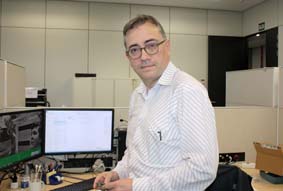
Analog Devices, a leading technology company in the semiconductor and electronics industry, has recently set up a development centre in the University of Valencia Science Park. The centre is the only one of its kind in Spain and the largest in continental Europe. A world leader in operational amplifiers and signal converters, this American company’s staff includes more than 60 highly qualified employees. It has two main aims: enhance interaction with research groups and incorporate new talent into the company from the university environment.
Founded 50 years ago in Massachusetts , Analog Devices (ADI) is one of the largest semiconductor manufacturing companies in the world. A leader in advanced signal processors and high-performance converters (the bridge between the analogueand digital worlds), the company has a catalogue of 10,000 high added value products. The company has a global workforce of over 9,000 employees and more than sixty branches worldwide. With an annual turnover close to 3,000 million dollars a year, its customer base includes the world's leading companies in consumer electronics, industrial applications and communication infrastructure.
The Development Centre located in the Science Park includes more than sixty highly skilled employees spread across four specific disciplines, namely, microelectronic design, applications, design evaluation, and layout. It is involved in four main lines of work: design of integrated sensors and of integration of control systems in single chip solutions; transmission and reception of high speed signals; ultra-low consumption systems design, and application systems in health and wellness. The Centre has laboratories for evaluating integrated circuits and developing application prototypes.
"Analog Devices arrived in Valencia a decade ago, after identifying Spain as the provider of the best assets for a technology company: the talent," said Javier Calpe, director of the Development Centre in Spain. The centre was set up with a reduced workforce of technical staff mainly from its center at Limerick (Ireland), the most important ADI outside the US. "Since then, we have been incorporating Valencian graduates into the company." Analogue electronics engineers, hardware applications and layout specialists are the most soughtafter profiles in this company, which is almost entirely formed by highly qualified professionals.
Fully consolidated in the large scale international consumer and industrial market, this multinational intends to increase its impact on the Spanish production system due to its proximity to the university scientific community. "The University, as a knowledge generator and transmitter, must contribute to strengthening the production system. There is no point in forming well prepared graduates if the labor market does not take advantage of them, and this is also a task for companies. For Analog, interacting with university research groups and attracting young talent to the company is key," concludes Javier Calpe.
The new Analog Development Centre occupies 1500m2 in the companies area at the Science Park, which already included about twenty small ICT companies. The arrival of this multinational signals the consolidation of a well-established area devoted to Information and Communication Technologies. This latest development shows the University of Valencia’s commitment to this emerging sector that is gaining ground to become one of the core values of our academic institution, along with Biotechnology, in contributing to the transformation of the production system into a knowledge-based model.
The University of Valencia Science Park, in collaboration with the Spanish Higher Council for Scientific Research (CSIC), now houses six research institutes, two unique centres, a large equipment support service for experimental research and a business area with almost ninety scientific and technical based companies. All in all, it has become a complete ecosystem for innovation led by the Biotechnology and ICT sectors, with a growing presence of other economic sectors, such as Renewable Energy, Nanotechnology and Advanced Services.
Last update: 13 de january de 2016 10:11.
News release



















